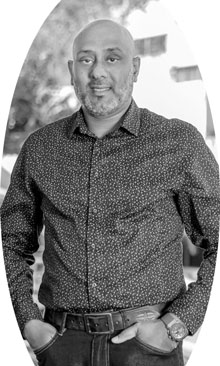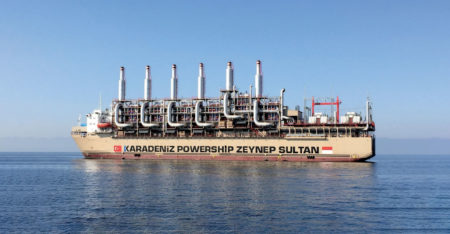TechCentral’s CxO Insights is a fresh look at the roles and careers that define the technology industry today. In this series, we’ll interview some of South Africa’s most successful, interesting and prominent individuals to find out how their roles evolved, the skills they need to succeed in these roles, and what has influenced or shaped their careers. These interviews provide an in-depth look into how technology is redefining the boundaries of career, skills and growth within the digitally transformed organisation.
In this profile, we meet Sun International CIO Pragasen Pather, who has had a stellar career in the IT industry, with a particular focus on security, risk and governance. But what many don’t know about Pather is that he has also had a career in tennis. In this interview, he speaks about trends, tennis and current challenges.
What are your current challenges?
If I look at the way we are structured, in terms of having a central IT function and a business support function that provides shared services capabilities across the group, there is an historic gap between how we create synergies between these two areas. One of my challenges is to get these teams working better together and making sure that we collaborate in a way that’s going to help our business see the value provided by a holistic service.
There’s also a need to have a look at our suppliers and our relationship with them. Many have had long-term relationships with evergreen contracts, but I want to make sure we deliver real value with strategic partnerships in a competitive environment.
How big is the team you work with?
My security team is quite small, with two people. The central office IT team has a headcount of 60. However, we have many vacancies. Recruitment is also a challenge in these trying times, and Covid has brought about delays with appointments.
It is also difficult to retain some of the critical skills due to high demand in different industries and we therefore explore models where we compliment the internal skills with outsources service providers.
 What’s on your agenda for this year?
What’s on your agenda for this year?
Our Sun International mobile app is a key differentiator for us to launch this year. The hospitality industry was late to embrace digital technologies, but now there’s a big push globally to move to a more cashless environment.
If you had to look at Covid in a positive way, it certainly fast-tracked South Africa’s consideration of how digital technologies can enable business and customer engagement. One of the things we’ll be bringing to market soon is a new online booking engine, which we believe will enhance our customer experience.
Interestingly, some of our research has shown us that casinos and hospitality companies in Las Vegas are also starting to move to mobile apps, so this is certainly a trend in the right direction.
How do you protect people from themselves when you have an app?
Many years ago, when we started building casinos, they were placed in more strategic distant locations so competition wasn’t strong. People had to make a conscious decision to go and take advantage of the facilities and gamble at our casinos. However, this doesn’t apply when you move into the online or app space, where it is so much easier to get influenced by constant betting. Even though it’s a compelling revenue stream, you have to balance ethical and moral considerations. So, with SunBet – our online betting business – we’ve made certain that our customers go through a validation process. They need to register online, after which we ensure we check their IDs against the home affairs database. We do as much as we can to make sure that people are betting responsibly and must conduct annual reviews with the various gambling boards.
Tell us a bit about security threats and how people could impersonate Sun International websites…
There are hackers and perpetrators who create websites that claim to be associated with other organisations. We have also been subject to some of these at Sun International, where these fake sites claim to offer booking services, discounts and sell accommodation on our behalf. We conduct regular scanning on the Web to detect these fake sites and shut them down.
We also conduct regular external assessments called “digital footprinting” to determine whether there are any threats to our online brand presence, and should we detect these we follow due process with our legal teams to maintain our intellectual property.
 How do you protect your organisation from these types of threats?
How do you protect your organisation from these types of threats?
We constantly run vulnerability scans and security testing to determine various types of threats and these include compromises where staff might be a target of perpetrators. Examples are where staff might unknowingly use their work e-mail addresses to subscribe to different social media platforms or non-business marketing material. These are risky as a compromise on the social media platform could compromise Sun.
Sometimes these websites ask for a plethora of other details, such as your ID number, gender and other types of information. The risk here is that such information could be used by hackers to get into our systems, because they will have enough detail to start trying to enter a company’s systems.
The response to this is to not just to educate our employees about strong passwords but also enable tools like multi-factor authentication.
How do you educate your colleagues?
We try and draw a comparison of work threats and employees’ personal lives, and ensure they protect the workspace similarly to how they would their own personal space. In the same way that you wouldn’t go out and leave your home unlocked or code to your safe on a Post-it note, you shouldn’t leave your computer unlocked with passwords written on pieces of paper.
This is one of the most challenging aspects of what I do. It’s not about the latest technology anymore; it’s about educating people and ensuring the human security is our first line of defence to protect our IT assets.
Tell us about your tennis career…
Pather: I started playing tennis at a young age — in primary school, when my dad bought me my first tennis racquet. In high school, in the late 1980s, I started a more serious interest and had a coach who helped me develop into a more competitive player. There was still a strong racial divide and, as Indians, we could only play in local tournaments. Towards the early 1990s, I realised my potential when I took part in the first multiracial tennis tournament and ended the year being ranked number four in KwaZulu-Natal. After matric, my interest in tennis diminished — as one becomes a young adult, one starts to explore other interests. After university and getting my first job, I was keen to travel and explore what lies beyond South Africa.
 I moved to London in 2000 and worked for one of the largest financial institutions, where I gained my greatest experience travelling around Europe. Being in the birthplace of tennis, I was once again exposed to the sport when I joined a prestigious club called Ealing Lawn Tennis Club. This was one of the oldest grass courts club in the world and bred many Wimbledon champions in the 1800s and 1900s. I got exposed to playing again and had my first Wimbledon experience where I got to watch some of my tennis idols. That experience help persuade me to study to become a tennis coach and, while working for Citigroup, I studied part time for six months at the University of Nottingham.
I moved to London in 2000 and worked for one of the largest financial institutions, where I gained my greatest experience travelling around Europe. Being in the birthplace of tennis, I was once again exposed to the sport when I joined a prestigious club called Ealing Lawn Tennis Club. This was one of the oldest grass courts club in the world and bred many Wimbledon champions in the 1800s and 1900s. I got exposed to playing again and had my first Wimbledon experience where I got to watch some of my tennis idols. That experience help persuade me to study to become a tennis coach and, while working for Citigroup, I studied part time for six months at the University of Nottingham.
This gave me the opportunity to coach youngsters and adults from the ages of 2 upwards and I was so motivated to see how passionate people in the UK were about tennis that I even contemplated making this a full-time job. I also managed to watch my childhood idol, Andre Agassi, play on Wimbledon’s centre court — one of the most emotional and fulfilment moments of my life. I also played in a charity doubles match against a then-little known Andy Murray.
About Pragasen Pather
Pather joined Sun International in 2019 as group manager: IT security, risk and governance to manage its information and cybersecurity risk and ensure it limits any breach or cyberthreat.
Prior to joining Sun International, he held various director roles at Tiger Brands and Liberty, where he was responsible for a diverse portfolio of group functions, including business continuity, IT security, risk and governance, group forensics, and group procurement. Pather has sat on various group board committees to provide independent assurance on IT and security risks. He has vast international experience and spent 11 years in London as head of technology for Citigroup across Europe, the Middle East and Africa, were he helped drive the execution of technology strategies through innovation and people collaboration.
Pather studied a bachelor of commerce in business management through Unisa and qualified as a tennis coach with the British Tennis Coaches Association.




